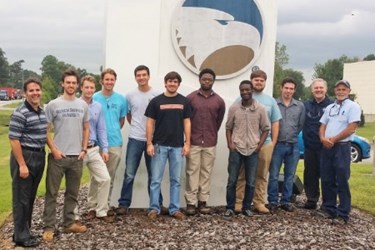Georgia Southern Students To Help Herty Center Reduce Wastewater By 90 Percent

Students to address wastewater management, measure performance of materials used in transportation sector
The Herty Advanced Materials Development Center is sponsoring final-year capstone projects for 18 undergraduate engineering students at Georgia Southern University. In this year’s projects, students will assess a range of industrial problems and work in teams to find solutions. Using Herty’s expertise and resources, one team of students will address the issue of wastewater management to reduce water usage, and another team will focus on the equally important challenge of developing a process for measuring the performance of materials produced at the Center and used in the transportation sector.
The capstone project, required for graduation, is designed to solve real-world problems through process design, technology selection and budget constraints. The project allows students to demonstrate their capabilities as an engineer by bringing together all the skills and knowledge learned during the students’ undergraduate programs.
“The capstone project is an important part of the undergraduate experience as it combines all the learnings into a focused effort while emphasizing teamwork to solve problems,” said professor Brian Vlcek, Ph.D., chair of the Department of Mechanical Engineering. “We are thrilled the Herty Advanced Materials Development Center, which is a world-class research facility, is undertaking this endeavor to help develop our undergraduates and give them the experience in research and industrial applications they will need as they move forward in their careers.”
Wastewater management is a $600B a year industry that is becoming an increasingly important field. According to the United Nations, one-fifth of the world’s population is challenged by water scarcity, and another 1.6 billion have limited access for economic reasons.
“This means that three billion people have poor to limited access to clean water,” said Alexander A. Koukoulas, Ph.D., president and CEO of the Herty Center. “With much of the western United States in severe to exceptional drought conditions, water management has become an issue of national importance.”
Under the mentorship of Herty, one student team will assess current water use and water pretreatment processes to develop a system that will recover and reuse 90 percent of all water used at the facility. The goal is also to design the system to meet water quality targets and provide a payback period of three years that would justify the capital expenditures for the new system.
“We are pleased with this opportunity to work with great young minds and use their creativity and capabilities to solve a problem that is becoming a key challenge for government, communities and industry, namely, the management of water,” added Koukoulas. “Herty conducts a range of development projects where we typically discharge up to 100,000 gallons of wastewater per day. By working with these student engineers, our goal is to reduce this amount by 90 percent, essentially eliminate wastewater discharge and drastically reduce our need for fresh water. The environmental benefits and cost savings in doing this will be significant, and the knowledge we gain through this project could be used as a model for local industries looking to conserve their water use.”
The students completing this project will first assess current water use at Herty to establish a baseline of water use and quality. They will then use client-defined water quality targets to select appropriate water treatment technologies. Herty currently pretreats its wastewater by removing solid materials. The challenge for the students is to find cost-effective technologies that will further clean the wastewater stream so that it can be returned to the facility and reused without compromising operations. Treatment options that will be considered include nanofiltration and reverse osmosis (RO) and forward osmosis (FO). The FO system, an emerging desalination technology, is particularly attractive because of its low operating costs and other far-reaching applications.
The second team will undertake a completely different but equally important challenge to develop a process for measuring the performance of materials that are produced at Herty and used in the transportation sector. The students will design and construct a test rig that will be used to measure material properties that Herty scientists believe will be predictive of end-use performance.
“At this time, the only measure of end-use performance is actual use in the field. Through the development of this test rig, we expect to be able to measure properties in the lab. This will not only benefit our quality control program but it will open a whole new door to product development, where we can drastically reduce cycle times,” said Walter Chappas, Ph.D., director of Advanced Materials for the Herty Center.
The Herty Advanced Materials Development Center, an applied research center of Georgia Southern University, is a world-class research, development and demonstration facility. Located in Savannah, Herty was established in 1938 as a state authority and became part of Georgia Southern in 2012 at which time the Center began working with undergraduate and graduate students to provide real-world experience in industrial processing and technology development. Herty is a new product and process accelerator providing technical, market and development expertise in short-fiber composites, biomaterials, and biomass processing. Herty’s expertise and extensive pilot-scale capabilities for prototyping new products help companies de-risk the commercialization process. For more information, visit herty.com.
About Georgia Southern University
Georgia Southern University, a public Carnegie Doctoral/Research University founded in 1906, offers more than 125 degree programs serving more than 20,500 students. Through eight colleges, the University offers bachelors, masters and doctoral degree programs built on more than a century of academic achievement. Georgia Southern is recognized for its student-centered and hands-on approach to education. For more information, visit GeorgiaSouthern.edu.
Source: Georgia Southern University
